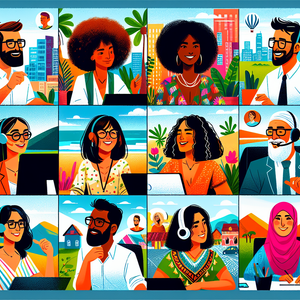The Art of Fidelity in the Age of Digital Romance

Historically, fidelity was a straightforward concept: being loyal to one partner and refraining from romantic or sexual involvement with others. However, the proliferation of dating apps such as Tinder, Bumble, and Hinge has made it easier than ever to meet potential partners, complicating this traditional view. The convenience of swiping through profiles can foster a mindset of abundance, leading individuals to question whether they should settle for one person when countless options are just a swipe away. Moreover, social media platforms like Instagram and Facebook enable users to maintain connections with ex-partners and potential love interests. This interconnectedness raises concerns about emotional fidelity, as individuals may engage in emotionally charged interactions with others online. The sharing of personal experiences and intimate moments on these platforms can lead to comparisons with other relationships, increasing the risk of dissatisfaction and jealousy. In a world where physical boundaries are constantly tested, the definition of fidelity becomes increasingly ambiguous.
Challenges to Trust and Loyalty
The hyper-connected nature of modern relationships presents several challenges to trust and loyalty. The constant temptation of digital interactions can lead to feelings of insecurity, as individuals may struggle to fully commit to their current partner when alternative options are so easily accessible. A study published in the journal Cyberpsychology, Behavior, and Social Networking highlights that frequent engagement with social media correlates with higher levels of relationship dissatisfaction, as individuals often compare their love lives with those of others, leading to feelings of inadequacy. Additionally, the concept of "micro-cheating" has emerged in response to these challenges. Micro-cheating refers to seemingly innocuous behaviors—such as flirty texts, secretive social media interactions, or emotional sharing with someone outside the relationship—that can create significant trust issues. Couples often find themselves grappling with the blurry lines of infidelity in a digital context, which can lead to misunderstandings and conflict.
Expert Opinions on Modern Fidelity
To gain further insight into the complexities of fidelity in the digital age, we consulted Dr. Laura Berman, a relationship expert and author. Dr. Berman emphasizes that open communication is paramount when navigating fidelity in the context of modern romance. "Couples need to discuss their boundaries and expectations clearly," she advises. "What might seem harmless to one partner could feel like a betrayal to another. It's crucial to have these conversations to ensure both parties feel secure." She also notes that technology can facilitate stronger connections. Couples can use relationship-focused apps like Lasting or Couple, which offer tools for improving communication and intimacy. These platforms can help partners cultivate deeper emotional bonds and reinforce their commitment to one another.
Real-Life Stories of Navigating Fidelity
To illustrate the realities of fidelity in the digital age, we gathered stories from individuals who have navigated these complexities. Emily, a 28-year-old marketing professional, shared her experience in a long-distance relationship. "My boyfriend and I were always checking each other's social media, and I found myself feeling insecure when he liked pictures of other women," she recounts. "We had to sit down and discuss what was acceptable for us, and it helped us build trust." Likewise, James, a 35-year-old tech entrepreneur, reflects on his experiences in the dating app landscape. "I went on a few dates while seeing someone, thinking it was just harmless fun," he admits. "But when my partner found out, it shattered her trust. It was a wake-up call that made me realize how quickly things can spiral when you're not clear about your intentions."
In conclusion, the art of fidelity in the age of digital romance is a multifaceted blend of trust, communication, and clarity. As technology continues to shape our relationships, it is essential for couples to engage in open dialogues about their expectations and boundaries. By doing so, they can foster a deeper sense of loyalty and commitment, even amidst distractions and temptations. Ultimately, fidelity transcends merely avoiding infidelity; it is about nurturing a connection that can withstand the tests of modern love. As we navigate this digital landscape, redefining fidelity together becomes a shared journey, one that can strengthen the bonds between partners and cultivate lasting love.
Relationship Coach Specializing in Digital Communication
Private practice, counseling centers, or online coaching platforms like BetterHelp
Core Responsibilities
Provide guidance to individuals and couples on navigating relationship dynamics influenced by technology.
Facilitate workshops on healthy communication strategies and boundary-setting in the context of digital interactions.
Conduct one-on-one coaching sessions to help clients address issues of trust and fidelity in their relationships.
Required Skills
Strong background in psychology or counseling, with a focus on relationships.
Excellent communication skills and the ability to foster a safe space for clients to share their experiences.
Familiarity with digital communication platforms and their impact on modern relationships.
Digital Marketing Specialist for Relationship Apps
Companies like Lasting, Couple, or other relationship-oriented app developers
Core Responsibilities
Develop and implement marketing strategies to promote relationship-focused apps, highlighting features that enhance communication and trust.
Analyze user engagement metrics to optimize content and outreach efforts.
Collaborate with product teams to ensure marketing aligns with user needs and expectations.
Required Skills
Proficiency in digital marketing tools (SEO, PPC, social media).
Strong analytical skills to interpret data and adjust strategies accordingly.
Creative mindset with experience in crafting engaging content for diverse audiences.
Content Writer for Relationship Blogs or Publications
Online magazines, relationship-focused websites, or content agencies
Core Responsibilities
Research and produce engaging articles on topics related to modern relationships, fidelity, and the impact of technology.
Collaborate with experts to gather insights that can enhance content credibility and relevance.
Stay updated on current trends in relationship dynamics and digital communication.
Required Skills
Exceptional writing skills with a knack for storytelling and conveying complex ideas in an accessible manner.
Familiarity with SEO best practices to increase article visibility.
A background in psychology, sociology, or a related field is a plus.
Social Media Manager for Relationship Brands
Relationship-focused brands, dating apps, or wellness companies
Core Responsibilities
Create and manage social media content that fosters engagement and discussions around fidelity and relationships in the digital age.
Monitor and analyze social media metrics to refine strategies and improve community engagement.
Respond to audience inquiries and facilitate discussions that promote healthy relationship practices.
Required Skills
Expertise in social media platforms and their algorithms.
Strong interpersonal skills for community management and audience interaction.
Creative content creation abilities, including graphic design or video editing skills.
Therapist Specializing in Couples Therapy
Private practices, mental health clinics, or teletherapy platforms
Core Responsibilities
Conduct therapy sessions focused on helping couples navigate issues related to fidelity, trust, and communication in the digital era.
Design tailored therapeutic approaches to address individual and relational challenges posed by technology.
Provide tools and strategies for improving emotional connection and clarity in relationships.
Required Skills
Licensed mental health professional with specific training in couples therapy.
Strong understanding of the psychological impacts of technology on relationships.
Ability to facilitate open dialogue about sensitive topics in a constructive manner.


